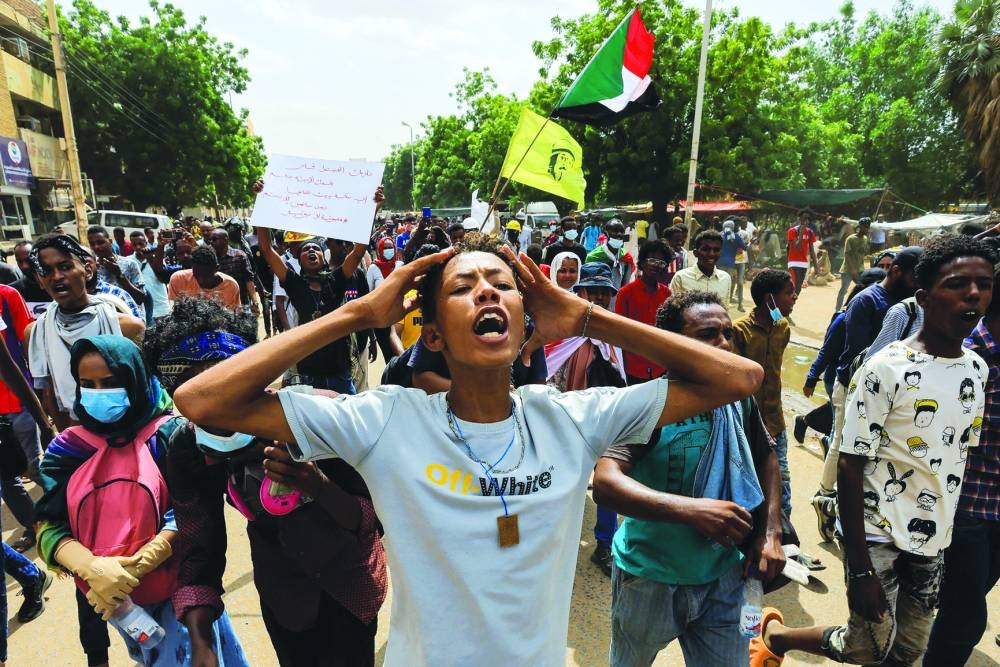There are concerns and suspicions following the declarations by the army suggesting the intention of not going ahead in the political process, which was sponsored by the three mechanisms, the United Nations, the African Union, and the Intergovernmental Authority on Development, in addition to the Quartet (US, UK, KSA, and UAE.)
On the other hand, there is vehement support for the Framework Agreement political process from the Rapid Support Forces (RSF). This uncovers a crack in the military component. Also, the crack in the civilian component cannot be hidden — on Tuesday 7 February 2023 the final communique of the Cairo Workshop confirmed the attendance of 35 factions! So how many organisations are there in Sudan? This frightening number cannot be based on fundamental differences. However, ethnicity, tribalism and warlords’ interests are shaping a valid abominable warning.
Sudan’s future remains in doubt. Nevertheless, on December 5, 2022, a Framework Agreement was signed between the military component and the Forces for change and freedom. Some other stakeholders also signed the ambitious agreement. Consequently, there was a glimmer of hope that a civilian-led government will be formed in Sudan to craft thoughtful economic-based policy solutions. March 31, 2023, is probably what all political sides have to focus on, as it is perhaps the most important date in the economic history of contemporary Sudan. The external debt of Sudan is massive, overall, it has accumulated due to arrears, it has reached 150% of the local GDP and it is about 10 times vis-a-vis the country’s exports and imports. This certainly is intolerable.
In April 2021, Word Bank and World Monetary Fund decided that Sudan became qualified for an exemption from external debts. Benefiting from the initiative of Heavily Indebted Poor Countries (HIPC,) Sudan did get approval for an exemption of $23.5bn of its debt. It has been ranked 36 amongst the countries that obtained this exemption within the framework of HIPC. However, these decisions were suspended, and international parties stipulated that Sudan regain its democratic civilian transition in order to resume their aid. In the case of Sudan being able to move forward and complete this process for debt exemption, it will be able to receive urgent grants and loans with low or no interest via international organisations and financial institutions.
Some 11% of Sudan’s external debt is due to multilateral creditors; 42% to Paris Club; 36% to non-Paris Club creditors, and 11% to commercial creditors.
In May 2021, Sudan signed an agreement with the World Bank and Paris Club, in addition to a few countries considered to be part of Sudan’s friends. The agreement stated to wipe $50-60bn. Moreover, it was to provide emergency financial/economic grants to support the democratic civilian transition. This is largely connected to the poverty level and raising the living standard of the average Sudanese citizen.
In March 2021, Sudan paid back its delayed payments to the World Bank and African Development Bank. The delayed payments to the African Development Bank, which accumulated to $425mn, were paid via a bridging loan offered by Sweden, Britain, and Ireland, whereas the delayed payments to the International Development Association (IDA), eventually reached $1.1bn, with a bridging loan from the US.
In June 2021, the arrears to the Monetary Fund which reached $4.1bn were paid. At the Decision Point, expectations were that the burden of external debt will be reduced from $56bn to $28bn. It was hoped that Sudan would reach the Completion Point in the month of June 2024, which will, in turn, reduce Sudan’s debt to $6bn dollars.
The urgent support which was supposed to reach Sudan was $2.5bn, $2bn of which was to be paid by the International Monetary Fund (Berlin Conference.)
According to the International Monetary Fund, the outside debt of Sudan by the end of December 2019 was limited to about$ 50bn, $56bn by the end of 2020.
However, Sudan is now coming close to $60bn; this means that Sudan’s debt is increasing at the rate of $1 or $2bn annually, due to the interest on arrears. The coup which was carried out by the Commander-in-Chief of the Sudanese Army in October 2021 ended in the freezing of the process. Eventually, the international community stopped all promised aid. Nonetheless, the Commander-in-Chief requested from the World Bank and International Funds a waiting period of three months before making their decision to cancel Sudan’s debt exemption which was supposed to be made on December 31, 2022.
To exempt Sudan, the World Bank and the International Monetary Fund put several conditions. Article 26 of the structural reforms asked for spending on governance, complete enforcement of the law, getting rid of corruption, and presenting to court the individuals accused of taking public money, together with the need for an independent committee to combat corruption based on a new law passed in 2020, which stated the inevitability of having a comprehensive dismantling of the institutions of Omar Bashir’s June 30, 1989 regime. Article 26 correspondingly required the publication of a list of the state-owned companies, and those owned by the army and security authorities.
Some of the observers, inside and outside, fear that Sudan is heading towards a multi-split civil war because of this dominating reality which is characterised by political failure and lack of national trust, and absence of reasonability in the handling of fundamental problems.
Would Sudan succeed in resuming a genuine collaboration with international economic and financial institutions to avoid the risks of the rising costs of debts, taking into consideration the current escalating interest rate?
Are there any chances of success?
• Mohamed Sulieman Elfaki al-Shazly is a prolific writer and senior TV producer. The British/Sudanese author has won several awards for his works, including the Tayeb Salih International Prize for Creative Writing.

Protesters march during a rally against military rule following the coup in Khartoum last July. (Reuters)
